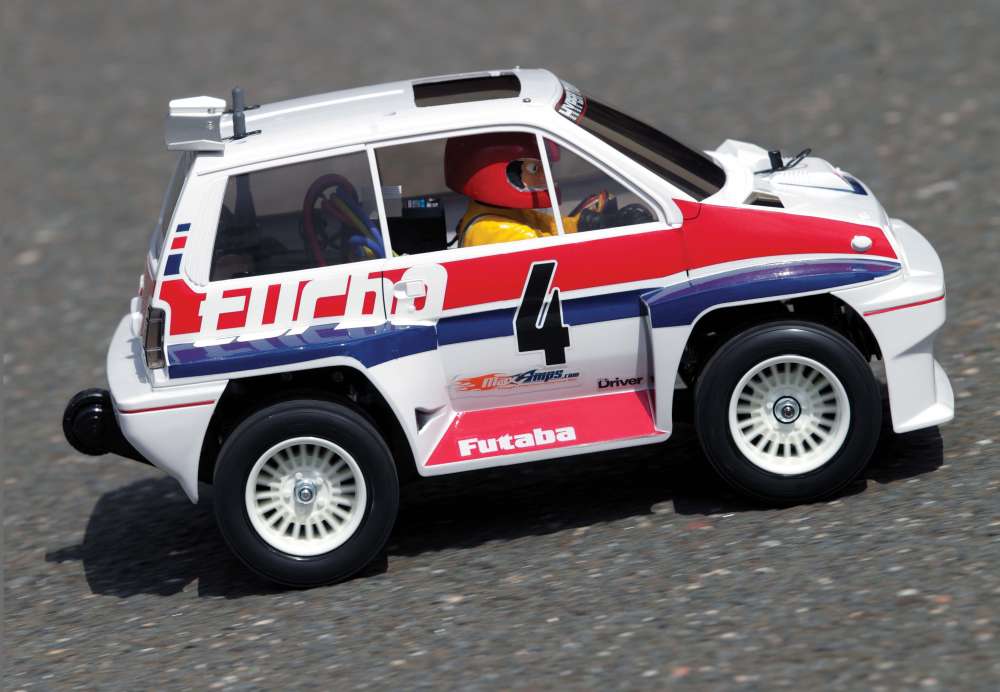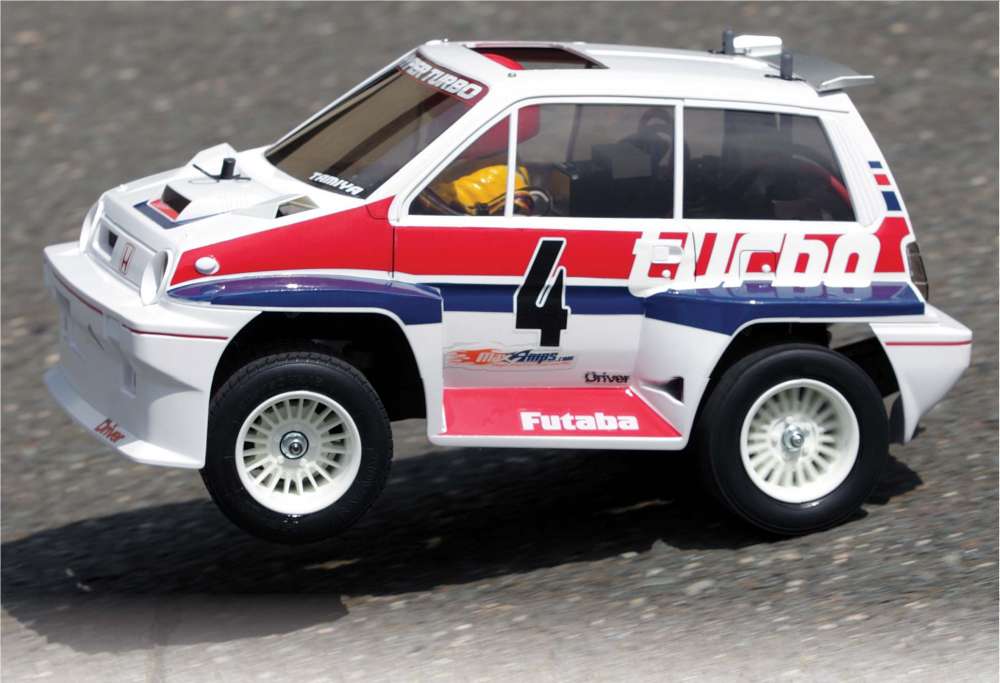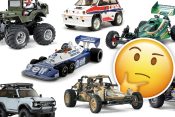TAMIYA TurboTurbo City Honda WR02C KIT
This article was originally published in RC Driver’s August 2015 issue.
Photos by Walter Sidas
Reminiscent of vehicles from the golden age of RC, the new Tamiya Turbo City Honda evokes memories of early models from the manufacturer. Complete with a hard shell body and helmeted driver figure, this wheelie popping street ride is all about fun and just looking at it will bring on the smiles and laughs. Built off of the wildly popular WR02 chassis, the Turbo City Honda is a revised version of those same wheelie machines. The one vast difference between the WR02s and this WR02C is that this new Honda is the first street purpose vehicle based on the design. Originally released in 1983, the Turbo City Honda was marketed as Wild Willy’s street ride and it is now back in all its glory.
As this is a Tamiya kit, we knew the build was going to be a breeze. Keeping with their “Built-Up” tradition, the instruction manual is detailed and explains specifically what you’ll need for each step. As with all kits from the manufacturer, the WR02C chassis shares parts with many other platforms in Tamiya’s lineup, so don’t be surprised when you have a pile of parts left over after the build. The kit includes a pre-built gearbox with the motor already mounted so the hardest part is complete before you even open the box. A 4-way wrench is also supplied so really the only other tool you’ll need for the assembly is a #2 Phillips head driver. The best part about this kit, for us anyway, was the hard-shell early Honda body with all of its scale detail. Of course, the Willy driver figure is pretty sweet, too.
WHO MAKES IT: Tamiya
WHO IT’S FOR: Everyone
PART NUMBER: 58611
HOW MUCH: $168.99
BUILD TYPE: Kit
PROS
• Included ESC runs sensored brushless or brushed motors
• Quick, easy building kit with excellent instructions
• Pre-built transmission with mounted motor
• Tough as nails construction
CONS
• Phillips head hardware
• Friction dampers leave a bit to be desired
REVIEWER’S OPINION
I’ve been a big fan of the Tamiya kits since the mid ‘80s so when this model came in, I jumped at the opportunity to write the review. One model I never had was the original Wild Willy’s Jeep. It was only fitting that I snag Willy in his street machine. Just like his off-road rig, this little Honda is about one thing and one thing only …WHEELIES! The super wide rear tires and hard-shell body give this model an aggressive, yet innocent appearance. Its lines and looks are reminiscent of something you might have seen in an old Robotech or Jabber Jaw cartoon. I do have to admit that it took nearly as long to apply the
stickers to the body as it did to build the kit itself, but it looks killer and once it was all dressed up, we were almost afraid to drive it. Alas, Willy wouldn’t be happy unless this machine was ripping wheelies and creating smiles, so off we went.
TOOLS & ACCESSORIES INCLUDED
• 4-way wrench
• ? Small tube of lube
ITEMS NEEDED
• ? Servo
• ? Transmitter and receiver
• ? Battery
• ? Paint
ITEMS USED
Futaba 4PKS-R (FUTK4903)
Once the flagship radio for the Futaba surface team, this system offers way more in the way of programming than we’ll ever need for this vehicle, but it’s nice to know it’s there if we need it. With the ability to employ third and fourth proportional control, perhaps a micro servo mounted in Willy’s bust to turn his head when the front wheels are steering might be in order.
MaxAmps 5000mAh 6-cell NiMh Shotgun Pack, $67.99
MaxAmps knows a thing or two about batteries so when we got to choosing a pack for our Honda, their new 5000mAh Shotgun pack was a no-brainer. Because of the high capacity, it is a snug fit in the battery tray, but a little elbow grease is all that’s needed to pop it in. Besides, 5000mAh will provide anywhere from 30 minutes or more of runtime depending on your driving style.
ADDITIONAL ITEMS USED
Hitec 425BB Standard Deluxe Servo (31425S) $12.99
Hitec offers the best bang for your buck servos on the market today, which is why we went with their 425BB servo for our project. There is no saver provided for Hitec servos in the kit, so you’ll need to provide your own if that’s the way you decide to go. The 425BB offers smooth movements for such a modestly priced unit thanks to the ball bearing supported shaft and motor.
Kimbrough Servo Gear Saver Hitec, (131) $3.79
Kimbrough makes a number of different servo savers from mini to monstrous, but we only needed this one for our kit. To get the factory supplied ball studs threaded into the plate, we did need to enlarge the openings a bit with a body reamer. The stiff spring in this unit will offer better precision than the stock plastic unit, but will continue to protect the gears of our 425BB servo.
TOOLS & ACCESSORIES INCLUDED
• 4-way wrench
• Small tube of lube
FEATURE BREAKDOWN
The chassis design of the WR02 cars as well as this WR02C look complicated, but they really aren’t. It’s essentially two sandwiched sections that are bolted together. The side rails are really just there to stiffen the whole thing up and offer a little protection for the internal components. The battery compartment is up high and in the rear, so the front wheels spend more time on the ground than they do off of it. Perhaps the only drawback to this design is that the steering servo is buried in the front end, so there’s a good deal of disassembly to be done to get it out should you need to.
The suspension on the Turbo City Honda is of the fully independent, wishbone style. The friction dampers are equipped with rubber damping tubes on the inside of the bodies as well as on the outer part of the shafts themselves. On our first few runs, we found that the front shafts (basically a long Phillips head screw) would get caught in the internal tube, binding the shock. It was as easy as yanking on the shock to fully extend it to remedy the problem, but we ultimately removed the internal dampers from each shock. It resulted in a bouncier ride, but we actually preferred it to the rigid ride with the dampers employed.
As with most Tamiya kits, this one includes a silver can 540 motor. Nothing out of the ordinary there, but the ESC provided with this kit is the TBLE-02 which is capable of running the Tamiya sensored brushless motors or any brushed motor over 25 turns. Yes, you heard that right, this 170-dollar kit includes a sensored, brushless capable ESC! Some might consider the silver can motor a bit anemic in the power department, but let’s remember that this machine is all about short power bursts to get the front end up and nothing else.
The mid-mounted motor allows for the use of a four-gear transmission. This equates to a smoother power delivery and some pretty good balance when not in the wheelie stance. The steering seems to be hampered by the hard treaded tires and lack of foams, but it performs pretty darn well for a system without a bellcrank setup. We also opted to use a Hitec servo for our kit, so we needed to use an aftermarket saver as there is none provided in the kit for the Hitec servos. Kimbrough came through with one of their standard savers.
The body and Wild Willy driver bust are the best parts about this kit for sure. Yes, the chassis is vastly different from the original Turbo City release, but the body is exactly the same. Keeping with that tradition, each kit also includes the crazy helmeted legend himself. Again, take your time applying the decals and painting up the driver bust as a little patience pays big dividends in the looks department after the fact.
OUT TO PLAY
STEERING
As we mentioned before, the steering on the Honda City Turbo is nothing to write home about, but for what this vehicle is intended for, it doesn’t matter. The Hitec 425BB has plenty of grunt to swing the big front tires around, but the lack of foams and hard compound do not lend themselves well to cornering on a dime. At low speeds, the steering is effective enough to carve a tight turn, but once the power is up, the little Honda tends to push a bit. No worries, we weren’t planning on the front wheels touching the ground much anyway.
ACCELERATION/BRAKING
The throttle and braking response of the TBLE-02 ESC and silver can motor are fantastic. There is something to be said about the smoothness of a brushed system and this one is no different. The factory installed 18-tooth pinion gives great low end torque to the Honda, resulting in the obligatory wheelies. For those that want a little more top end, the gearbox can also accommodate for a 20-tooth pinion, but remember that this gear will cut down on the wheelies and run time. Should you choose to switch to a brushless motor the TBLE-02 can be programmed for different brake strengths, furthering the tuning options.
HANDLING/JUMPING
Handling of the Turbo City Honda was actually quite a bit better than we had originally anticipated. The first few runs had us unexpectedly spinning out at some points, largely due to the shock shafts getting caught in the internal damper tubes. Once those were removed, the Honda had a bit more chassis roll, but was much easier to keep control of. We even sent it through a slalom course once or twice just for kicks and it handled surprisingly well. Some oil filled shocks would greatly aid in this area, but again, that’s not what this machine is about. Contrary to what our reader might think, we can exercise some restraint occasionally. With that in mind, we did not send the Honda airborne throughout or test runs.
DURABILITY
From the hard shell body, to the super thick two-piece A-arms and on down to the huge front bumper with spring loaded backup, the Turbo City Honda is tough as nails. At first, we were wary of cracking the body in the event of a crash, but after a couple of rollovers, we threw caution to the wind. One has to remember; if the front wheels aren’t on the ground, one cannot steer. Unfortunately, we forgot that rule a time or two and rode a wheelie a bit too far, resulting in a stab of the brakes followed by the little tuner import bouncing backwards off of a curb. Willy’s Honda took it all in stride and kept coming back.
DIMENSIONS
LENGTH: 12.3 in. (318mm)
WIDTH: 7.9 in. (200mm)
WHEELBASE: 7.3 in. (185mm)
WEIGHT: 64 oz. (1814g)
BODY, WHEELS AND TIRES
BODY: Hard-shell resin
WHEELS: White plastic
WHEEL ADAPTER TYPE: 12mm rear, pin-drive front
TIRES: Treaded street tires
SUSPENSION TYPE: 4-wheel independent
SHOCK POSITIONS: (F) 1-tower, 1-arm, (R) 1-tower, 1-arm
CAMBER: Fixed ROLL: Fixed
WHEELBASE: Fixed
RIDE HEIGHT: Pre-load collars on the shocks
STEERING
TYPE: Direct to servo links
TOE: Threaded rod
CHASSIS
TYPE: Sandwich frame with side rails
MATERIAL: Plastic
THICKNESS: N/A
DRIVETRAIN
TYPE: 2WD
TRANSMISSION: Single speed
DIFFERENTIAL: Bevel diff
GEAR RATIO: Optional pinion gears
BEARINGS: Plastic bushings
CLUTCH TYPE: N/A
RATING TALLY
Opinion: 10
Performance – Acceleration: 9
Performance – Steering: 6
Performance – Handling: 5
Performance – Durability: 9
Feature Breakdown: 9
Overall Value: 9
I’ll be the first to admit that I generally like cars and trucks that go fast and catch big air. Sure, I do my fair share of crawling, but this is an entirely different beast. The Turbo City Honda is a street machine from days gone by of RC and the re-release is a welcome offering. Forget about prepping your race rig all week for five minutes of fortune and glory. Pop a pack in Willy’s Honda and you’re guaranteed more than just a few smiles as a result. The build is easy enough for even first timers and the economical price point means there will be a ton of them finding their way into novice hands. Customizing your own Turbo City Honda is as easy as selecting your own paint scheme and Tamiya USA offers up a full line of spares and support equipment should you push the envelope a little further than us. Besides, that’s the only way Willy would drive this Honda himself … hard and fast with the front wheels hanging in the breeze!
Links
Futaba futaba-rc.com, (217) 398-8970
Hitec hitecrcd.com, (858) 748-6948
MaxAmpsmaxamps.com, (888) 654-4450
Tamiya tamiyausa.com, (949) 362-2250
 RC Driver The Best In RC Car & Truck News, Reviews & Video
RC Driver The Best In RC Car & Truck News, Reviews & Video










